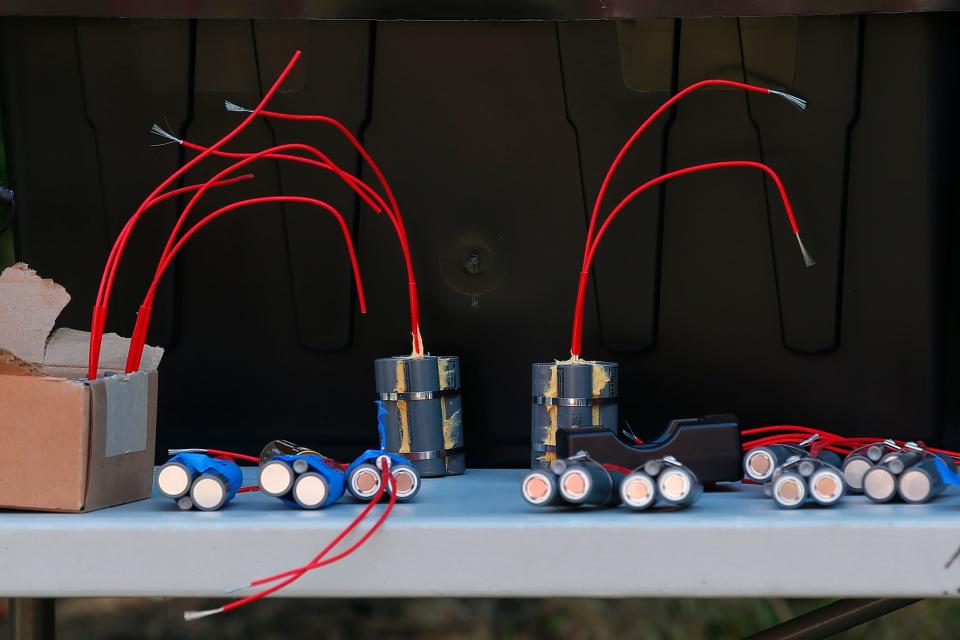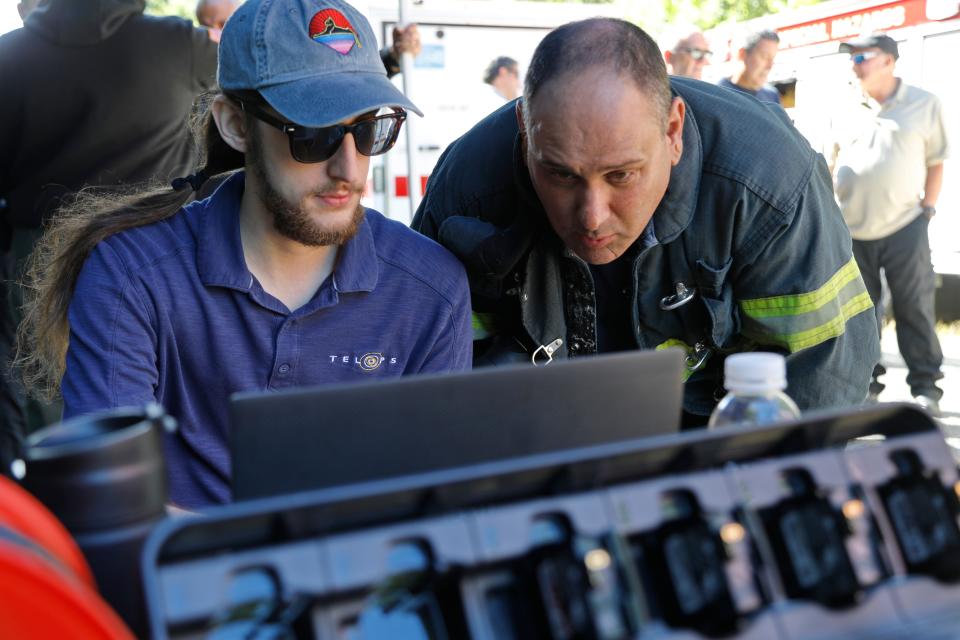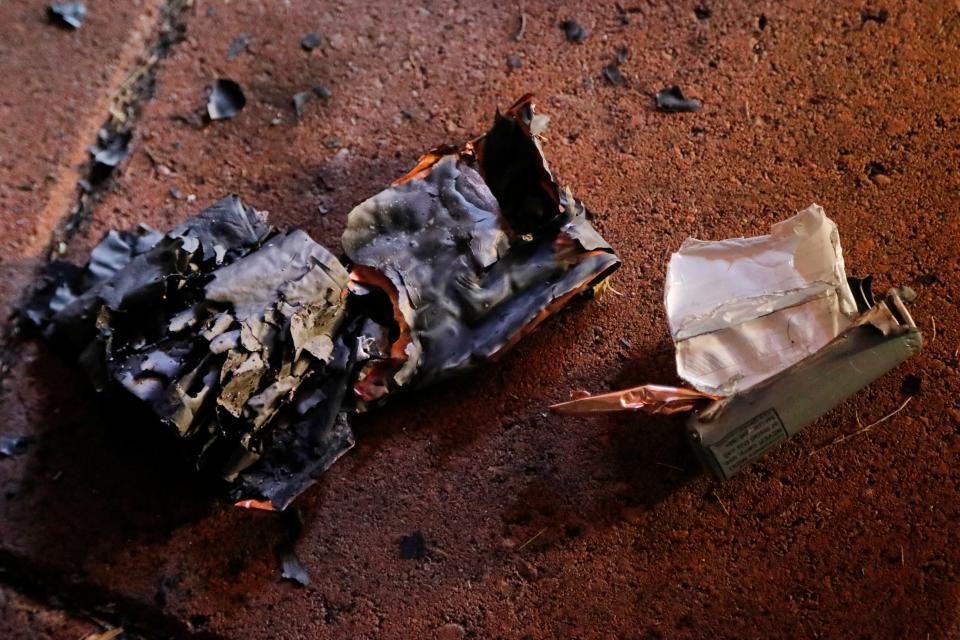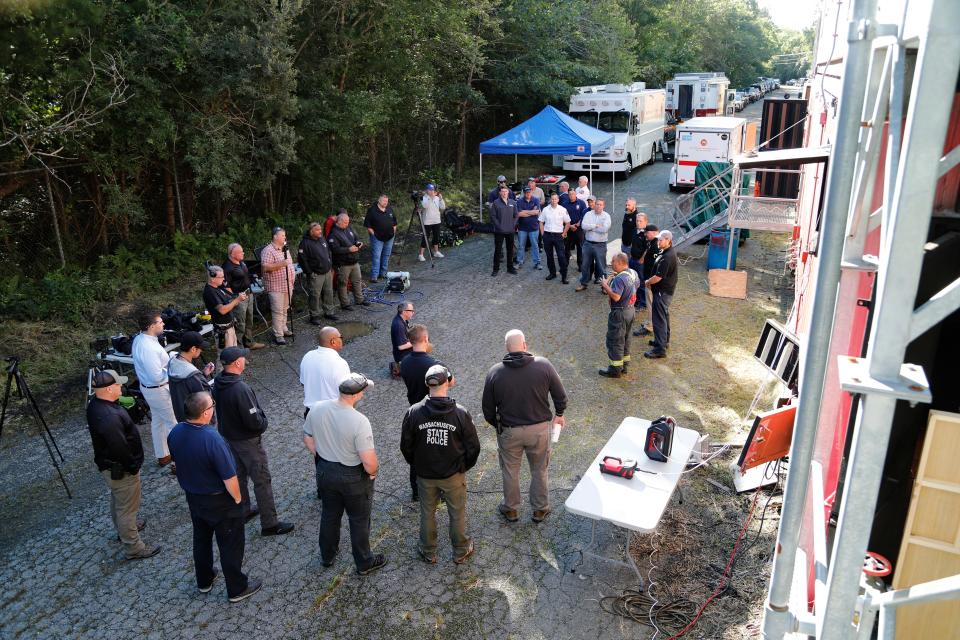These batteries are a rapidly emerging fire hazard. Here's what New Bedford is doing.
NEW BEDFORD — An increased demand for rechargeable lithium ion batteries has in turn led to an increase in fire incidents involving them, experts say. While the batteries — found in everything from cellphones to motorized bikes, electric cars and portable chargers — aren't anything new, professionals attending a demonstration in New Bedford on Thursday say the uptick in fires started by them has grown exponentially in recent years.
"Before, it was a lot of silo tanks, diesel spills, gasoline," said Bobby Salvesen, who retired from the New York City Fire Department last year. "During my last two years, these [lithium ion batteries] just took over our runs. Now, 80% of their runs are for them. It's crazy."
Salvesen and fellow FDNY retiree Mike Monaco started "The Haz Mat Guys" podcast in 2015. But with shockingly little data available around lithium ion batteries and the nature of their volatility, and the two began using their extra time to branch off into instructional training and research focusing on the topic.
An experimental demonstration
On Thursday, New Bedford became home to some of that research when The Haz Mat Guys were hosted at New Bedford Fire Department's training/burn facility on Aviation Way to conduct a demonstration and produce recordable data. The event was organized by NBFD in partnership with The Haz Mat Guys, State Fire Marshal's Office, and several companies, including CellBlock FCS, New Bedford's provider for special gear used in dealing with lithium ion batteries.
"We're going to take some of the most common battery cells, put them in thermal runaway and see how they burn," said New Bedford Firefighter and state hazmat education and training coordinator Travis Rebello. It was through Rebello's longtime field connections with Salvesen and Monaco that Thursday's event was arranged.
As the batteries burned from being intentionally put in thermal runaway — the state in which they typically become hazardous — personnel on site captured gases let off by the fire to be analyzed in a nearby lab truck, and a number of thermal imaging cameras captured footage to show the temperatures at which various stages of the combustion occurred.
Keep up with city news: Is the City Council saving New Bedford taxpayers $7.65 million? Road work is at stake.
"What we get out of it as a city is to make sure that what we think are the appropriate methods for dealing with these batteries actually work," Rebello said, noting state fire investigators and Fire Marshall Jon Davine himself were in attendance, as well as fire chiefs and personnel from around Mass. "At the state level, the information we gather here he wants to push out statewide to all fire departments to say, hey, this works, this doesn't."
Salvesen said after processing results of the day's experiments, the data would be made available to share freely, and the day's work will also be used to make a podcast episode.

"It's kind of a data finding mission and we're going to pack it into a MythBusters type of episode. It should be fun," Salvesen said, estimating the trials, which began around 9 a.m., would conclude at about 4 p.m..
Are lithium ion batteries an issue in New Bedford?
When asked of the prevalence of battery fires in New Bedford, examples as recent as August readily come to mind for NBFD members.
"I had one four-to-six weeks ago from a cellphone," said NBFD Captain Kurt Houghton. "She was pulling a battery out of her phone with a knife and it sparked in her hand, so she dropped it and it caught the rug on fire."
Another example recalled by Houghton and New Bedford Fire Chief Scott Kruger was from Aug. 3, when a truck carrying lithium ion batteries caught fire on Rte. 140.
Hungry? Read this: New Bedford Eats: sundaes, grilled cheese, and acai bowls
In May 2022, a downtown area house fire was determined to have stemmed from batteries used in a tenant's vaping devices.

"He had multiple vape pens on a chair," Houghton said. "They've exploded in people's mouths, in their pockets — you just never know."
Houghton and Kruger estimate in 2023 there's been about a half dozen fires in New Bedford attributed to the batteries. However Kruger said he believes they may go underreported due to challenges at times identifying a fire's cause.
How NBFD handles lithium ion batteries
In the 2023 examples, firefighters followed standard operating procedures tailored specifically to lithium ion battery fires: The batteries involved are placed in specialized containers and "overpacked" with a suppressant called CellBlockEX, Rebello said. They're then kept in a steel box at an isolated location for at least 60 days, as the batteries are known to be reignitable for up to 32 days.
"And that’s new. It used to be 15 days," he said. "Everything we know can change on a daily basis.... There's a bunch of different chemistries out there and that's kind of one of the problems we have. It's a moving target to make sure our methods work for every battery that's out there."

In the May 2022 example, those procedures were not followed, as they didn't yet exist.
While Kruger says the department considers itself ahead of the curve on lithium ion batteries, its standard operating procedures around them didn't come about until around February.
Stay current on local business: A popular New Bedford LGBTQ+ bar sold after 41 years. Here's the new owners' plans.
"Even a year and a half ago there was really not much awareness about this stuff," Kruger said.
Now, Rebello and Kruger say they'll continue adjusting procedures as new information becomes available, and consulting with sources such as FDNY and The Haz Mat Guys.
"[Salvesen] has been getting phone calls from me in the middle of the night for a long time now, like, hey Bobby, I'm looking at this — what do you think?," said Rebello. "These guys have kind of pioneered the battery response."
Battery safety: What to know
According to CellBlock FCS Business Development Executive Maxwell Weerts, rechargeable batteries that are UL certified are known to be safer than those that are not.
"While the safety of some batteries is being improved every year, we see the total amount of incidents still increasing steadily," he said on site Thursday. "With the world going green, there's always more batteries on the market."

Weerts also advised caution with cheaper, off-brand batteries and using unverified third party shops to repair devices.
Rebello said batteries that have been dropped or damaged have a higher likelihood of going into thermal runaway, and that partially burned batteries are more likely to reignite as opposed to those that were more completely consumed.
Doing big things! See what's happening: This star-studded pilot could be a New Bedford filmmaker's big break
The National Fire Prevention Association advises taking lithium ion batteries to be disposed at a specialized recycling site, or contacting local disposal services for instructions.
Other NFPA advice includes:
Stop using a battery, move away and call 911 if you notice odor, change in color or shape, heat, leaking or odd noises.
Do not keep charging a device or battery after it's fully charged.
Do not charge devices under pillows, or on beds/couches.
Do not charge in temperatures below 32 degrees Fahrenheit or above 105.
Store batteries away from anything that can catch fire.
Never keep discarded batteries in piles.
For more battery safety information, visit www.nfpa.org.
Visit The Haz Mat Guys online at www.thehazmatguys.com to check for the New Bedford episode.
This article originally appeared on Standard-Times: Experts research lithium ion battery fires in New Bedford

